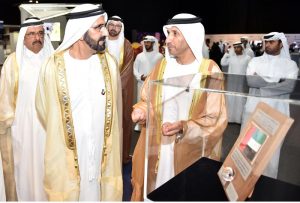The agency is working on the establishment of the first Space Research Centre in the Middle East, which will cost nearly AED100 million over five years
The UAE Space Agencys initiatives were unveiled in Abu Dhabi yesterday, in the presence of HH Sheikh Mohammed bin Rashid Al Maktoum, ruler of Dubai, and Vice President and Prime Minister of the UAE.
The UAE Space Agencys Director General, Dr. Mohammed Nasser Al Ahbabi, said: “The UAE Space Agency has drafted its strategic plan in line with the vision of the wise leadership of the UAE and the UAE Vision 2021 aimed at establishing the UAE as one of the worlds leading countries in time for the UAEs Golden Jubilee, celebrating the 50th anniversary of the founding of the nation.”
Over the course of 2015, the UAE Space Agency will select 15 gifted students as an academic delegation traveling overseas and within the UAE. This educational mission will be in partnership with the Ministry of Presidential Affairs and the Information and Communication Technology (ICT) Fund. The UAE Space Agency will work with educational and academic bodies to use the concept of space as an inspiration and encouragement for students to embark on the study of science and technology in order to contribute to the UAEs journey toward space.
Dr. Al Ahbabi also revealed that the agency is working on the establishment of the first Space Research Centre in the Middle East. The centre, which will cost nearly AED 100 million over five years, is the result of a strategic partnership between the UAE Space Agency, UAE University and the Telecommunications Regulatory Authority represented by the ICT Fund. The centre will act as an incubator for space research and innovation at the federal level. To that end, the UAE Space Agency will coordinate with a number of agencies to implement the Emirates Mobile Observatory projects, to help enrich research and innovation in the field of space.
The plan consists of four main objectives.
The first is to develop and guide a world-class national space sector that serves the countrys highest interests, contributes to a diversified national economy and supports sustainable development. The second is to promote scientific research and innovation to support the states scientific progress in space sciences and technologies. The third is to attract and promote national resources to become space scientists and technology pioneers. The Agencys fourth objective is to build and enhance international cooperation and partnership in a manner that serves the national space sector and that provides administrative services with high quality standards and transparency.
The UAE Space Agency will create international partnerships to develop the national space sector in order to contribute to and facilitate knowledge transfers of Space technology. The agency also aims to represent the UAE in international conventions and programmes, the application of space technology, as well as contributing to space conferences and seminars within and outside the UAE. Moreover, the Agency will lend a helping hand to the tech sector in utilising space science and technology in the UAE. It will also provide consultation and technical support for all space sector stakeholders in the UAE.
Within the framework of those objectives, the strategic plan will be built on five pillars: Emirati pride, integrity, excellence, commitment, cooperation and innovation.
The plan contains a number of initiatives, programmes and activities that the Agency team will implement. To that end, key performance indicators have been put in place to match real-world performance with the goals of each initiative and program. Among the most important initiatives is working with the Mohammed Bin Rashid Space Centre and the Hope Probe team to deliver the Mars orbiter project on time, within budget and in accordance with industry best-practices.
Programmes concentrate on creating the organisational and legal framework for the space sector as well as its development and guidance. Moreover, these programs will support national efforts in the space sector, develop youth talent and increase public awareness about space.
Ex- NASA scientist and Apollo missions team member Dr. Farouk El-Baz said: “I would like to congratulate all citizens of the United Arab Emirates for what has been achieved by this young nation in less than half a century.
“Many people may not know that the founder of the UAE, Sheikh Zayed bin Sultan Al Nahyan, cared greatly about space and the scientific results achieved from the Apollo trips.”
El-Baz highlighted that he first met the late Sheikh Zayed in June 1974 following the end of the Appollo lunar exploration mission. He went on to meet Sheikh Zayed two more times along with astronauts from the Apollo missions to explain their missions.
He added: “UAE leaders have continued to be interested in identifying the secrets of the universe through space expeditions. The most important thing that becomes clear from all of the above is that the UAE intends to realise the hopes of Arabs everywhere.”
Samer Halawi, CEO of Thuraya Telecommunications Company, underlined Thurayas commitment to supporting the UAE Space Agency. Halawi commented on the inauguration of the UAE Space Agency strategic plan, saying: “We are proud to be part of the UAEs effort to place itself among the leading countries for satellite technology and the overall space sector. We strongly believe that the UAE is ready to lead the way.”
Yahsat CEO Masood. M. Sharif Mahmoud commented: “Space is proving to be a major economic driver here in the UAE, and for nations elsewhere. Through the UAE Space Agency, the country has developed a long-term strategic plan to create a solid and sustainable foundation for advanced space innovation and exploration a plan of which we are proud to be part.
”We remain confident that our collective industry experience and cutting-edge technology will continue to provide an excellent platform to launch the next phase of growth for the industry across the Middle East. This is only the start of the UAEs satellite and space adventure, and Yahsat is wholly committed to the rest of the journey.”
The UAE Space Agency will join the international space community to support space exploration and the international scientific community. The Agency will also oversee the development of the space sector in the UAE through the management and coordination of space-related activities.
Having developed its strategy in support of three main objectives stipulated by Decree No. 1 of 2014 issued by the His Highness Sheikh Khalifa bin Zayed, the President of UAE. That legal decree established the UAE Space Agency as a federal authority reporting directly to the Cabinet with financial and administrative independence. These three objectives comprise the development of the UAE Space sector, the development of policies for space-related activities and the promotion of space projects that will benefit the UAE economy.
Virgin Galactic CEO George Whitesides said: “We applaud the initiatives of the UAE Space Agency as it officially launches today. Space offers the opportunity for inspiration, discovery and progress. The aerospace industry is driving economic growth and technological innovation around the world, and the UAE is at the forefront of these trends.”
The inaugural Airbus Little Engineer Space Workshop will challenge some 100 students aged 15 – 17 to carry out a simulation of a launch mission to space. The workshop focuses on introducing students to the world of space exploration and enhancing their understanding of the benefits and applications of space technology. Over the course of four hours, students will assemble and launch a rocket, set up a base and establish communications. In addition to its direct scientific applications, Airbus Little Engineer Space Workshops will help students practice soft skills including teamwork, communication, critical thinking, public speaking and creativity.
The Airbus Group Little Engineer initiative aims at instilling a passion for science at an early age and encouraging students to enter science, technology, engineering and mathematics (STEM) fields through a series of exciting, hands-on workshops.
The workshops will also be offered as part of the Global Space & Satellite Forum 2015, which is officially hosted by the UAE Space Agency and will continue for three days at ADNEC.
The UAE project to explore Mars is the first Arab project of its kind, and will demonstrate that the Arab world is capable of enriching civilisation and human knowledge. The Hope Probe will also prove that enthusiasm, confidence and ambition can lead to success, despite the hardships the Arab world is facing.
The Hope Probe will stand as a symbol of hope and as a source of inspiration for new generations to look for a future filled with opportunity.
Dr. Charles Elachi, Director of Jet Propulsion Laboratory at NASA, said: “The UAEs Hope Probe to Mars will not only advance human scientific knowledge and strengthen the UAEs technological capabilities; it will also provide inspiration to all the young people in the UAE and throughout the Arab world.”

















































































